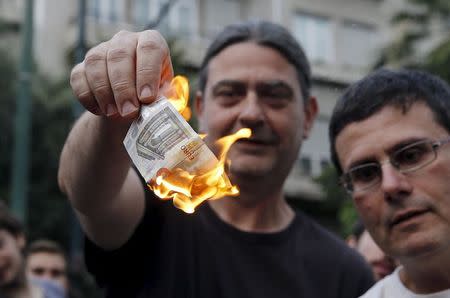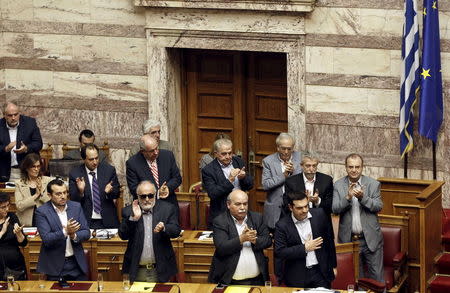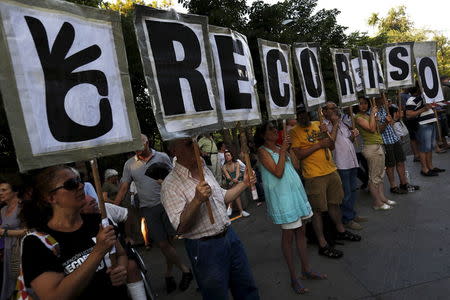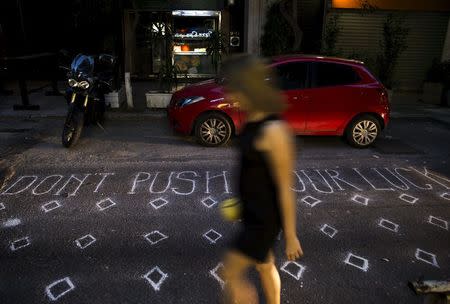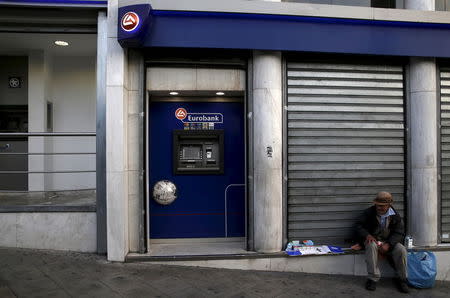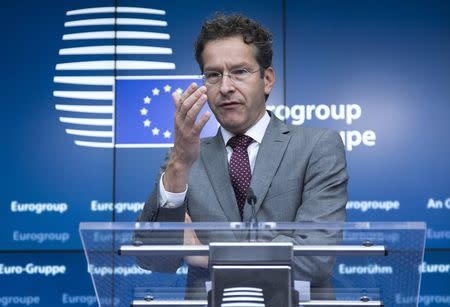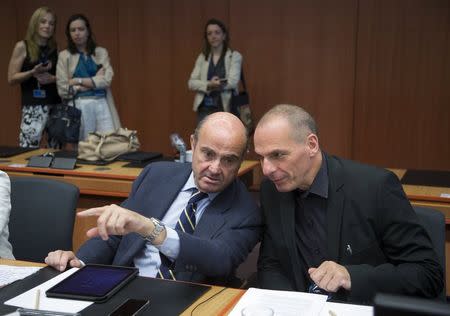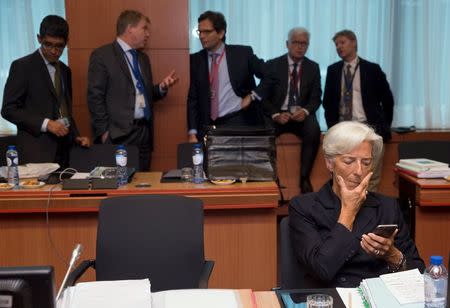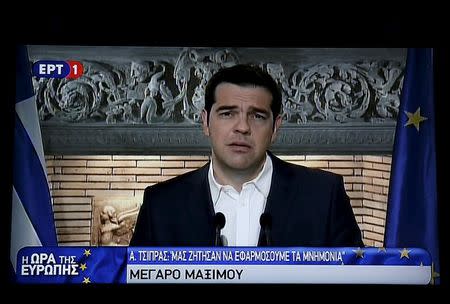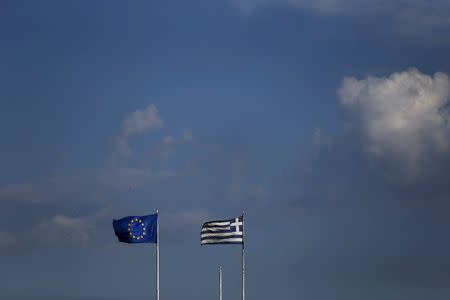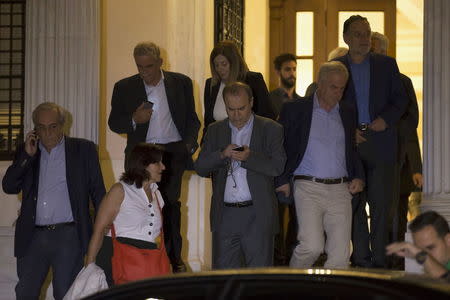Euro zone readies for Greek default after Tsipras referendum call
By Lefteris Papadimas and Robin Emmott ATHENS/BRUSSELS (Reuters) - Greece's European partners shut the door on extending a credit lifeline to Athens, leaving the country facing a default that could push it out of the euro and cause ripple effects across the European economy and beyond. Finance ministers of the other 18 countries sharing the euro met for the first time without Greece after flatly rejecting its pleas to extend an expiring bailout. The left-wing Syriza government had asked for an extension until after a July 5th referendum in which Greek voters would decide on whether to accept new, tough bailout terms that the government opposes. Without the extra time, Athens is set to default on a crucial IMF payment on Tuesday. The 18 blamed Greece for breaking off negotiations and pledged to do whatever it takes to stabilize the common currency area, declaring they were in much better shape to do so than at the height of the euro zone crisis a few years ago. "We are completely clear that we have to do everything to fight any thinkable contagion threat," said German Finance Minister Wolfgang Schaeuble. "We are resolved to prevent any uncertainty in the financial markets." In a formal statement announcing that "the current financial assistance arrangement with Greece will expire on June 30, 2015," the 18 also implicitly urged Greece to impose capital controls to stabilize its banking system. The rejection of an extension piled huge pressure on Greek banks, which depend on central bank support to remain afloat. Long lines formed in front of cash machines as people rushed to pull their money out while the banks were still operating normally. Greek Finance Minister Yanis Varoufakis insisted that a deal could still be reached in time for the IMF deadline on Tuesday, warning the credibility of the euro zone could be permanently damaged by its rejection of Greece's plea for more time. "It's a sad day for Europe," he said as he left the European Council headquarters in Brussels, where the other euro zone ministers were meeting without him. After its surprise decision to call a referendum, Athens asked for an extension of Greece's bailout programme beyond Tuesday, the day it must pay 1.6 billion euros to the International Monetary Fund or default. But the other 18 members of the euro zone unanimously rejected the request, freezing Greece out of further discussions with the European Central Bank and the IMF on how to deal with the fallout from a historic breach in the EU's 16-year-old currency. The swift rejection was a startling demonstration of the degree to which Tsipras had alienated the rest of the currency bloc with a final-hour announcement that upended five months of intense talks. "I think that the mistake was that, certainly from Greece, they were playing poker, but with poker you can always lose," said Austrian Finance Minister Hans-Joerg Schelling. DAMAGED CREDIBILITY Tsipras himself was defiant, saying his government could not accept the "insulting" terms offered by creditors and saying voters would do the same. "I am certain that the Greek people will rise to the historical circumstances and issue a resounding 'No' to the ultimatum," he said as he wound up debate before parliament voted in the early hours of Sunday to authorize the referendum. Pro-European Greek opposition parties united in condemning the decision to call the referendum. There was rising speculation that Tsipras' left-wing government may have to resign if voters back the bailout in the referendum. Underlining the topsy-turvy nature of the Greek bailout saga over several years, Tsipras was himself a fierce critic of former Prime Minister George Papandreou's abortive 2011 proposal to hold a referendum, warning at the time that it would cause economic collapse and a banking disaster. He has since had the same criticisms flung back at him by the opposition, which accused him of irresponsibly risking Greece's future in Europe. "Why don't you say 'No' to the foreigners directly? Why are you hiding behind the Greek people? You are afraid," said former conservative Prime Minister Antonis Samaras, leader of the opposition New Democracy party. The offer from creditors requires Greece to cut pensions and raise taxes in ways that Tsipras has long argued would deepen one of the worst economic crises of modern times in a country where a quarter of the workforce is already unemployed. Caught between fears of economic collapse and defiance of the demands from international creditors, many Greeks expressed shock, although opinion polls published in Sunday newspapers pointed to a majority in favour of accepting the bailout terms. "They are trying to kill us. I don't think this is a dilemma about whether to stay or leave the euro zone. But those bailout terms cannot be accepted," said 70-year-old George Kambitsis. "We don't have any money, but they want to take more from us. How will we eat, how will we live?" However, voters in other euro zone states - including economic powerhouse Germany, other southern states that have suffered austerity in return for EU cash and poor eastern countries with living standards much lower than Greece's - have lost patience. REFERENDUM Many questions remained about the referendum, which is being called over the terms of a bailout offer that may no longer be on the table. "You are calling on the Greek people to vote on a proposal in a negotiation that has already closed," Samaras said. But with fears growing that the foundations of the euro zone could be fatally weakened if Greece were forced out, French Finance Minister Michel Sapin insisted that Paris, at least, was still prepared to talk. "The 18 countries, apart from Greece, all said clearly that Greece was in the euro and should remain in the euro whatever the difficulties of the moment," he said. European Council President Donald Tusk said on Sunday he was in contact with all the governments of the euro zone to ensure Greece remained in the single currency. Underlining the mutual incomprehension that has marked months of often angry exchanges between Athens and its European partners, Varoufakis said the government would be prepared to recommend that voters back the deal if lenders agreed to improve the terms. The Eurogroup of euro zone finance ministers met in Brussels for what had been intended as a final negotiation of a deal and its chairman, Jeroen Dijsselbloem, said the door was still open. "The process has not ended. It will never end probably. We will continue to work with Greece. Many things could happen, many scenarios are conceivable," he said, without spelling out what steps Greece could take. But after they were blindsided by Tsipras's surprise middle-of-the-night announcement that he rejected their offer and would put it to voters only after Tuesday's deadline, one after another said all that remained to discuss was "Plan B" - how to limit the damage of default. "How can you continue to negotiate with a partner that says in advance that he'll be opposed to the package you are negotiating?" said Luxembourg Finance Minister Pierre Gramegna. With most Greek banks closed for the weekend, there was no sign of panic on the streets of Athens. Government officials said there was no plan to impose capital controls that would limit withdrawals. But police tightened security around bank teller machines as lines formed at some in the darkness almost as soon as Tsipras's early hours televised speech was finished. More than a third of automated teller machines across Greece ran out of cash on Saturday before they could be replenished, banking sources said. The Bank of Greece said it was making "huge efforts" to ensure the machines remained stocked. (Additional reporting by Karolina Tagaris, Vassilis Triandafyllou, Matthias Williams, Yannis Behrakis, Lefteris Karagiannopoulos, Michele Kambas and Gina Kalovyrna in Athens, Erik Kirschbaum in Berlin, Alastair Macdonald, Barbara Lewis, Robert-Jan Bartunek, Philip Blenkinsop, Alexander Saeedy, Renee Maltezou and Jan Strupczewski in Brussels; Writing by James Mackenzie and Peter Graff; Editing by Alastair Macdonald, Andrew Heavens and Steve Orllosky)
